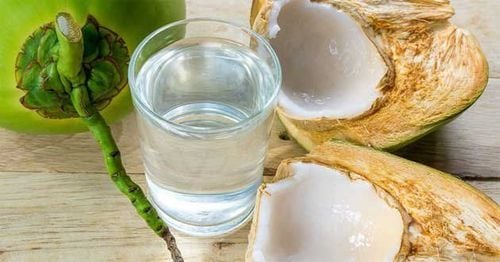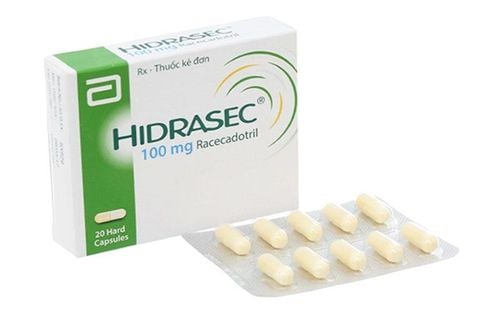1. Health benefits of coconut water for children
Coconut water has many beneficial effects such as:
• Improve skin health: Drinking coconut water helps moisturize your child's skin from the inside and remove excess oil. Coconut water has antibacterial, antimicrobial and antiviral properties that help treat skin infections effectively. In addition, coconut water can prevent acne from appearing on your child's skin when applied topically. Coconut water tightens your baby's skin and helps them have clean, bright and healthy skin.
• Promote digestive system activity: If your child often suffers from digestive disorders, drinking coconut water will help your child reduce the symptoms. Coconut water contains high levels of fiber, which helps promote digestion and minimize the occurrence of acid reflux.
• Prevents dehydration: Coconut water hydrates your child better than any other energy drink. It contains higher amounts of potassium, sodium, and natural sugars than other energy drinks. Therefore, coconut water has the ability to prevent dehydration.
• Develops strong bones: Coconut water contains high amounts of calcium. Therefore, drinking calcium-rich water will help your child have a strong skeletal system.
• Treats urinary tract infections: Children are more susceptible to urinary tract infections than adults. So should children drink coconut water? Drinking coconut water helps treat urinary tract infections in children, as it acts as a diuretic, which helps to eliminate infections from your child's bladder and urinary tract as well as minimizes the risk of kidney stones.
• Treats intestinal worms: Drinking coconut water is an effective remedy for treating intestinal worms in children. You can give your child a glass of coconut water every morning.
• Prevents cramps: Coconut water is rich in potassium, and a lack of potassium can cause cramps. Therefore, drinking coconut water prevents the risk of cramps and if your child is an active child who loves to run and play, you can add coconut water to their diet.
• Neutralizes toxins: Drinking coconut water is an effective remedy for diseases and disorders caused by toxins. Coconut water helps cure heartburn, dysentery, constipation, dengue fever and neutralizes toxins in the child's body.
• Boosts energy: Coconut water is low in sugar and sodium, and high in calcium, chloride and potassium. The richness of various nutrients helps rehydrate, replenish and refresh your child's body. Your child will feel full of energy after drinking a glass of coconut water.
• Improves circulation: Coconut water increases blood circulation in the body. Good blood circulation helps to provide enough oxygen to the skin and remove impurities.

2. Should children drink coconut water?
Coconut water is considered a recommended food for infants and nursing mothers. Coconut water is a great supplement that provides a great source of energy for children and even provides them with important lauric acid. This is the next best food to breast milk.
Coconut water contains a compound called monolaurin, which helps the baby's immune system fight off diseases, protecting babies from colds and flu, and even fighting infections. Coconut water is more nutritious than the regular tap water you drink. This is one of the many reasons why it is so good for babies, especially when they are sick. Coconut water provides many essential nutrients for children, including: fiber, calcium, potassium, sodium, vitamin C, protein.
Coconut water also provides a healthy amount of carbs. Each serving is only 46 calories! So you can rest assured that your little one is not getting more calories than necessary.
3. Give your baby coconut water the right way
If you want to give your baby coconut water, it is important to follow a few guidelines to ensure safety.
• Talk to your baby's pediatrician first
Before deciding whether to give your baby coconut water, you need to make sure that your pediatrician approves it. Most doctors will not object to this if your baby is at least six months old. Some doctors may consider it if your baby is under six months old because babies at this age are encouraged to be exclusively breastfed. They can get most of their nutrients from breast milk and coconut water may not play much of a role in their diet. Additionally, younger babies may develop allergic reactions, which can be dangerous.
• Start with small amounts of coconut water
Don't give your baby a whole bottle of coconut water at once. Instead, start with small sips, just like you would introduce new foods. At first, only give your baby small sips throughout the day. Repeat for about 3 days. If your baby doesn't have an allergic reaction, you can safely incorporate coconut water into your baby's diet.
4. Should your baby drink coconut water every day?
The answer is yes, but remember to only give your baby small amounts. It is important for children to have a varied diet with different foods and drinks. This helps ensure that children get their daily nutritional requirements met.

5. Some notes when giving children coconut water
Although coconut water brings many benefits, it is still necessary to pay attention to whether children should drink coconut water or not. Keep these things in mind to ensure optimal benefits and safety for your baby.
• Not All Coconut Water Is the Same
Unless you are feeding your baby the natural coconut water straight from the inside of a coconut, many parents buy store-bought coconut water or canned coconut water. Some brands may add other ingredients in addition to the natural coconut water. Coconut water is usually free of dyes and other harmful substances like other grocery store products, but manufacturers may add a lot of sugar. Be sure to read the label before buying to make sure your baby is not getting too much sugar.
• Too much coconut water can make your baby full
The younger your baby, the smaller their stomach. This means they may eat less when they drink more. While this is not a problem for sick babies, it can happen to babies who are not sick. Babies under one year old are supposed to get most of their nutrients from formula and breast milk. Older babies should eat and drink a variety of healthy foods. If you are giving your child coconut water, make sure they still have a varied diet. If you find that they cannot eat much, cut back on the amount of water.
• Give your child clean coconut water
Some coconut water may also contain pieces of raw coconut. Adults may enjoy drinking it this way. However, it is not safe for young children. The small pieces of coconut can cause choking. Babies under 6 months of age are at higher risk of allergies. Generally, you should not give your child coconut water until they are at least six months old because of the high risk of allergies. The younger the child, the higher the risk of allergies.
Regularly visit the Vinmec.com website and update useful information to take care of your baby and your family.













